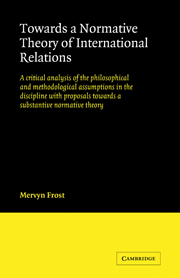 Towards a Normative Theory of International Relations
Towards a Normative Theory of International Relations Book contents
- Frontmatter
- Contents
- Acknowledgements
- Introduction
- PART ONE
- PART TWO
- CHAPTER THREE Normative issues in international relations: the domain of discourse and the method of argument
- CHAPTER FOUR Towards the construction of a normative theory of international relations
- CHAPTER FIVE Reconciling rights and sovereignty: the constitutive theory of individuality
- CHAPTER SIX The justification of unconventional violence in international relations: a hard case for normative theory
- Conclusion
- Bibliography
- Index
CHAPTER SIX - The justification of unconventional violence in international relations: a hard case for normative theory
Published online by Cambridge University Press: 05 March 2012
- Frontmatter
- Contents
- Acknowledgements
- Introduction
- PART ONE
- PART TWO
- CHAPTER THREE Normative issues in international relations: the domain of discourse and the method of argument
- CHAPTER FOUR Towards the construction of a normative theory of international relations
- CHAPTER FIVE Reconciling rights and sovereignty: the constitutive theory of individuality
- CHAPTER SIX The justification of unconventional violence in international relations: a hard case for normative theory
- Conclusion
- Bibliography
- Index
Summary
The purpose of constructing a background theory was to enable us to generate answers to some of the hard cases mentioned at the beginning of Chapter Three. In this chapter the aim is to demonstrate a practical application of this method. Let us look at the normative problems posed by various unconventional uses of violence in the modern world.
Unconventional violence as a normative problem in international relations
In the modern world few conventional wars are fought, yet there is a great deal of violence of one form or another in world politics. We are all acquainted with the typical cases. An embassy in London is raided by Iranian guerillas. The staff is held hostage and demands are made which are of an international nature. West Germany faces a shoot out at the Olympic games with Black September, a group who claim to be fighting for the rights of the Palestine Liberation Organization. Aircraft are hijacked by terrorists who demand the co-operation of several states in realizing their ends. The Irish Republican Army (IRA) is involved in many different kinds of violence, as is the Palestine Liberation Organization. States, too, practise various kinds of unconventional violence, for example sabotage against the installations of neighbouring states, active support of liberation movements engaged in violence of one sort or another in neighbouring states, and so on.
These diverse forms of violence pose a problem for normative theory of international relations because there is so much violence and because there are so few settled norms relating to it.
- Type
- Chapter
- Information
- Towards a Normative Theory of International RelationsA Critical Analysis of the Philosophical and Methodological Assumptions in the Discipline with Proposals Towards a Substantive Normative Theory, pp. 187 - 226Publisher: Cambridge University PressPrint publication year: 1986
